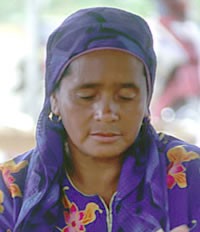Sama, Mapun in Malaysia

Photo Source:
Copyrighted © 2026
Peoples of the World Foundation All rights reserved. Used with permission |
Send Joshua Project a map of this people group.
|
| People Name: | Sama, Mapun |
| Country: | Malaysia |
| 10/40 Window: | Yes |
| Population: | 18,000 |
| World Population: | 71,000 |
| Primary Language: | Mapun |
| Primary Religion: | Islam |
| Christian Adherents: | 0.00 % |
| Evangelicals: | 0.00 % |
| Scripture: | New Testament |
| Ministry Resources: | Yes |
| Jesus Film: | Yes |
| Audio Recordings: | Yes |
| People Cluster: | Filipino, Muslim |
| Affinity Bloc: | Malay Peoples |
| Progress Level: |
|
Introduction / History
The Bajau peoples are classified by the government as Bajau, which is a group of predominantly Muslim people living along the west coast of Sabah. The Bajau subgroup includes the West Coast Bajau, and the Bajau Bukit (Papar). The language of the Bajau comprises a chain of mutually intelligible dialects which has been influenced by the Malay language. It is sometimes referred to as Borneo Coast Bajau. This language is mutually unintelligible with the Sama (East Coast Bajau) languages spoken on Sabah's east coast and in the region of the Sulu Sea.
The origin of the Bajau peoples is not certain, however, there is a documented report of their presence in the Kota Belud district in the 1850s and 1860s. Today their settlements spread along Sabah's coastal regions from Kuala Penyu of the Kuala Penyu district in the southwest to Terusan of the Beluran district in the northeast. The Tempasuk plain in Kota Belud, where the largest group of Bajau lives, is their cultural heartland.
What Are Their Lives Like?
The Bajau were once sea-nomads dwelling in boats, harvesting fish and other marine resources. These days, they have increasingly become land-dwellers and have become proficient in wet rice cultivation and livestock rearing. Some have developed into excellent horsemen. They grow small crops for personal consumption or for supplemental income as well as for engaging in trade. Businesses are growing in number but tend to be small and mostly related to food selling.
Increased opportunity for and appreciation of education has helped some Bajau to secure positions in a variety of wage-earning jobs. Improved transportation has enabled many of them to work in other parts of Sabah and Peninsular Malaysia. Work opportunities are scarce for those remaining in the villages.
What Are Their Beliefs?
The Bajau practice Islam and their religious holidays are directly tied to the Islamic calendar. For instance, they observe the Muslim holy month of Ramadan, during which time Muslims fast from dawn until dusk. Many Bajau have merged Islamic practices with their own local traditions, such as the reading of Arabic prayers at the beginning of a traditional celebration.
One such celebration is called the kenduri arwah, which is a feast practiced in honor of deceased family members. At such feasts, sedekah 'alms' are given to the pakir (the prayer leader); those who are remembered during the prayers accrue merit for the afterlife. They also observe celebrations that are not related to the Islamic calendar. For instance, feasts may be given at a baby's hair-cutting ceremony, and to celebrate a boy's circumcision. Smaller feasts are held to honor the fulfillment of a vow, or to request divine protection in the warding off of sickness or other danger.
What Are Their Needs?
The Bajau communities need infrastructure development in the areas of health and education. More medical workers, facilities, and services are needed. Many of their youth do not complete their schooling. Pray that God would send people to help them with these health and education needs. Pray, too, that their spiritual needs would not be neglected.
Prayer Points
Pray for a spiritual hunger that will lead the Bajau people to the cross and the empty grave.
Pray for the Lord to send out loving and dedicated workers.
Pray for Bajau elders to have dreams and visions of the risen Christ.
Pray for Bajau disciplers to make more disciples.